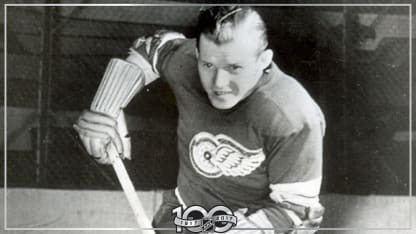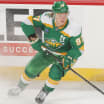In fact, when Gordie Howe reported to training camp with the Red Wings in the fall of 1946, the most common question he was asked was, "Are you related to Syd Howe?" whose 10-plus seasons with Detroit ended a few months earlier.
Syd Howe
took the all-time lead on March 8, 1945
, when he had an assist for the Red Wings in a 7-3 victory against the New York Rangers. It was the 516th point of his NHL career, moving him past Nels Stewart, who had 515 when he retired after the 1939-40 season.
Unlike Gordie Howe, Syd never led the NHL in any offensive category; the closest he came was finishing second in 1934-35 with 47 points in 50 games (10 points behind Charlie Conacher). That was the season when he came to Detroit in a trade with the St. Louis Eagles.
Howe fit in quickly with his new team, finishing with 20 points (eight goals, 12 assists) in 14 games. One year later, he helped the Red Wings to the first of back-to-back Stanley Cup championships.
The biggest night of Howe's career came on Feb. 3, 1944, when he scored six goals in a 12-2 victory against the Rangers in Detroit, the most by any player since the introduction of the red line in 1943. Howe's mark has been equaled twice (by Red Berenson in 1968 and Darryl Sittler in 1976) but never surpassed.
The six-goal night was part of a career season when Howe scored 60 points (32 goals, 28 assists).
Howe added one more point to his record before the end of the 1944-45 season and 11 more in 1945-46 before finishing his NHL career with 528 points. His time atop the NHL points list was short; he was passed by Bill Cowley of the Boston Bruins on Feb. 12, 1947. Eighteen years later, he was elected to the Hockey Hall of Fame.


















